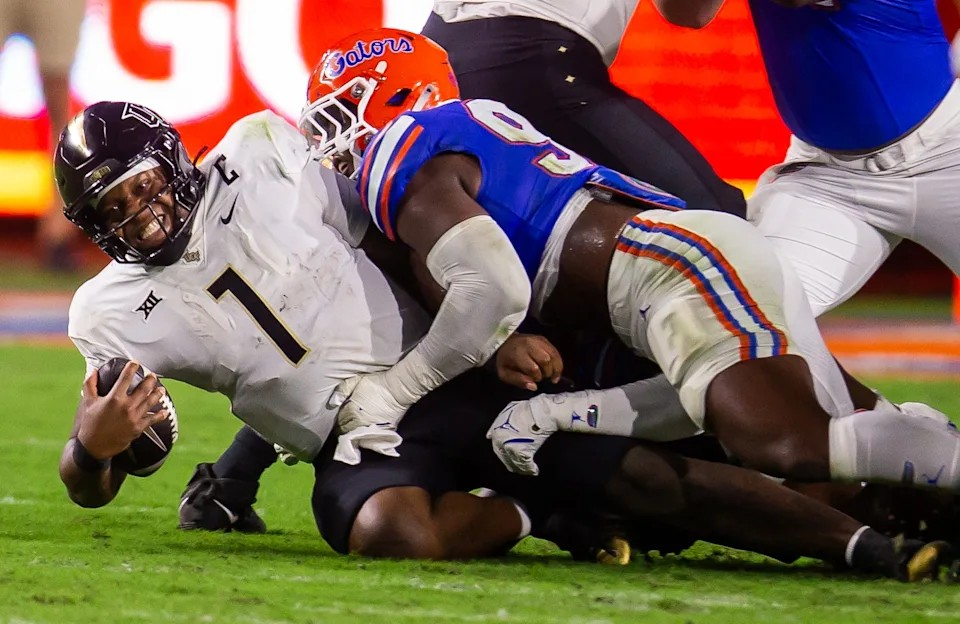

Scott Frost’s UCF Knights were looking forward to a “rare” Florida Gators game in an improved Acrisure Bounce House Stadium. What was supposed to be a marquee Sunshine State showcase could be on the chopping block. The two Fl. neighbors were pitched against each other on “private terms” on public demand, but now the long-awaited SEC announcement threatens to turn excitement into disappointment. It’s been a busy summer around the Kenneth Dixon Athletics Village, with construction crews leaving behind dust and scaffolding, but black clouds linger over whether the Knights will even get that home date.
Watch What’s Trending Now!
The SEC’s decision to implement a nine-game conference schedule beginning in 2026 has altered the calculus. The ripple effects are sharp. A UCF insider put it bluntly: “This very likely will lead to UF eventually cancelling the final two games of the UCF series (as we all pretty much predicted from the start). UF will have to pay UCF several million dollars to do so and, in this era, that isn’t the worst thing.” Under the 2021 three-game contract, if Florida or UCF pulled the plug on the 2024 or 2030 matchups, it’d be a $2.5 million fine. For the 2033 game, the fee drops to $2 million. If UCF bailed, they’d owe $5 million.
ADVERTISEMENT
From Billy Napier’s UF lens, walking away from both the 2030 and 2033 games would run them roughly $4.5 million. For an SEC program with deep pockets, that’s less a penalty than a speed bump. For UCF, though, the pain is more emotional than financial. This was the deal they had been waiting for. When new AD Terry Mohajir finalized it in 2021, the buzz was electric. Two trips to the Swamp in Gainesville—October 5, 2024, and September 14, 2030—were paired with the headliner in Orlando on September 3, 2033. For the Knights, it wasn’t just about gate revenue or a national spotlight. It was validation, a seat at the table with the program whose shadow had long loomed over them. Florida, meanwhile, kept control, dictating the “two-for-one” structure that gave them home-field advantage.
Two things here:
1) This *very* likely will lead to UF eventually cancelling the final two games of the UCF series (as we all pretty much predicted from the start)
2) UF will have to pay UCF several million dollars to do so and, in this era, that isn’t the worst thing https://t.co/rnTUKHn8n1
— Christian Simmons (@ByCASimmons) August 21, 2025
ADVERTISEMENT
The history between the two programs is short but fiery. They’ve met just twice, in 1999 and 2006, with Florida winning both convincingly. Yet the fanbases have traded barbs for years. UCF’s undefeated 2017 season and self-proclaimed “2018 National Championship” parade in Orlando only poured gasoline on the rivalry-that-wasn’t. Florida fans mocked. UCF fans doubled down. Social media lit up like a bonfire. Athletic directors in years past couldn’t get a deal done, but when Mohajir reignited the talks, the idea of finally settling it on the field was met with rare mutual interest. Now, the SEC’s format has pushed it back into jeopardy.
Commissioner Greg Sankey made the move sound like progress. “The SEC has established itself as the leader in delivering the most compelling football schedule in college athletics,” he said. “Fans will see traditional rivalries preserved, new matchups more frequently, and a level of competition unmatched across the nation.” The fine print, though, hits UCF square in the chest. SEC schools are now required to schedule at least one non-conference game against an ACC, Big Ten, Big 12 program—or Notre Dame. Florida, already managing its annual cocktail-party rivalry with Georgia and balancing the new nine-game grind, suddenly has less flexibility.
ADVERTISEMENT
That leaves Knight Nation staring at the possibility of just one showdown, the 2024 trip to Gainesville. The dream of a primetime Bounce House clash may never happen. As UCF fans funnel into the Bounce House for the Aug. 28 season opener against Jacksonville State, they’ll do so knowing the bigger party with Florida might never arrive.
ADVERTISEMENT
SEC finally joins the 9-game club—Playoff path gets clearer
The SEC just put an end to one of the longest-running debates in scheduling. Starting in 2026, the SEC will officially move to a nine-game conference schedule. It’s a shift that has been argued about for years, and now, with league presidents and chancellors giving the final stamp of approval after athletic directors had already recommended it, the SEC is catching up to its peers.
Commissioner Greg Sankey didn’t mince words on why this matters. “Adding a ninth SEC game underscores our universities’ commitment to delivering the most competitive football schedule in the nation,” Sankey said. “This format protects rivalries, increases competitive balance, and paired with our requirement to play an additional Power opponent, ensures SEC teams are well prepared to compete and succeed in the College Football Playoff.” No one can call the SEC soft anymore.
ADVERTISEMENT
And truthfully, this move couldn’t come at a better time. The Big Ten and Big 12 already live in the nine-game world, which has long given them an edge in strength-of-schedule debates. Now the SEC can match them, and with the College Football Playoff expanding, every data point matters. The league also noted that “record strength” is now part of the equation, meaning it’s not just about who you played, but how you performed against that slate.
ADVERTISEMENT
ADVERTISEMENT
ADVERTISEMENT
.png)
.png)
.png)



